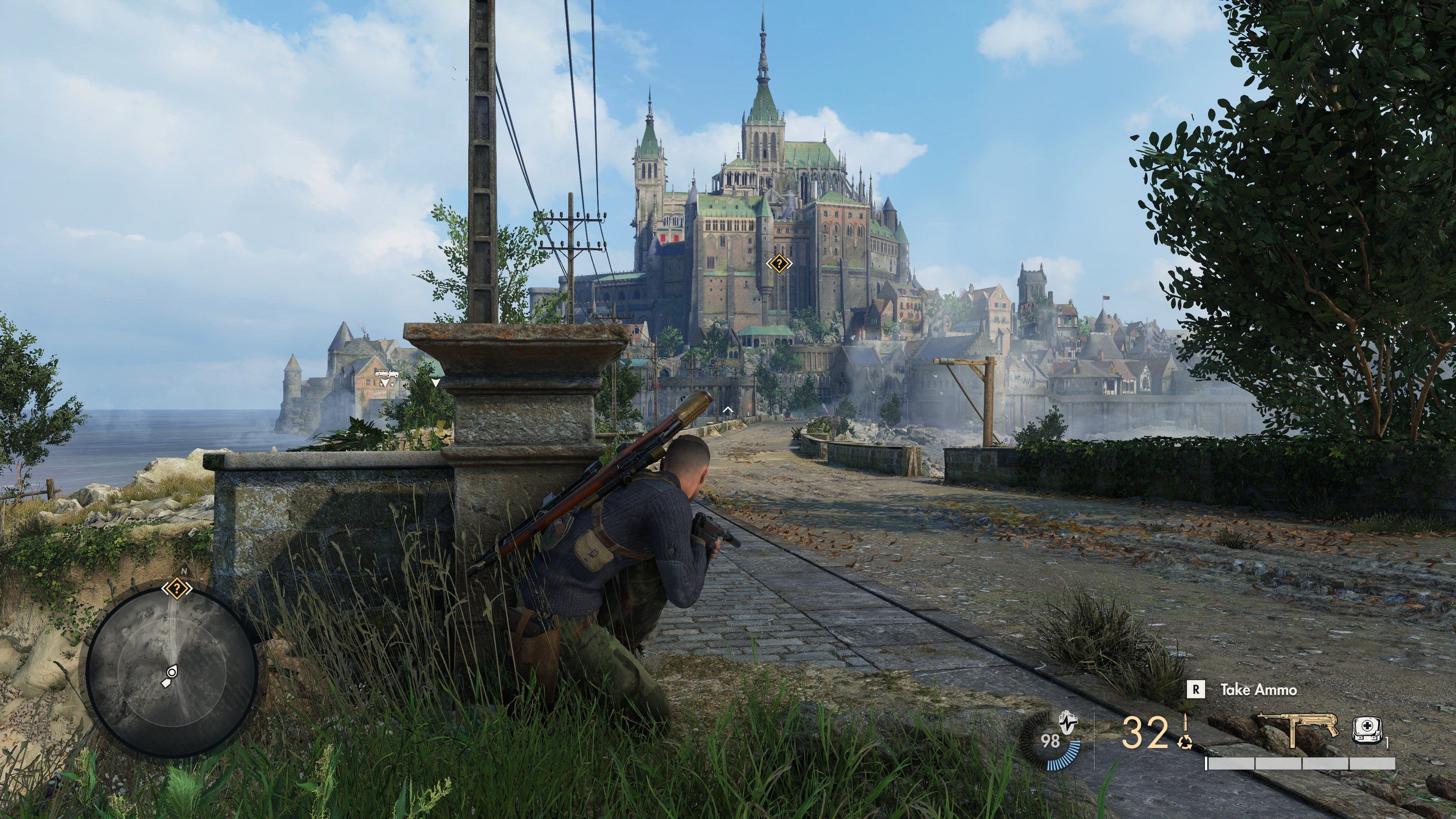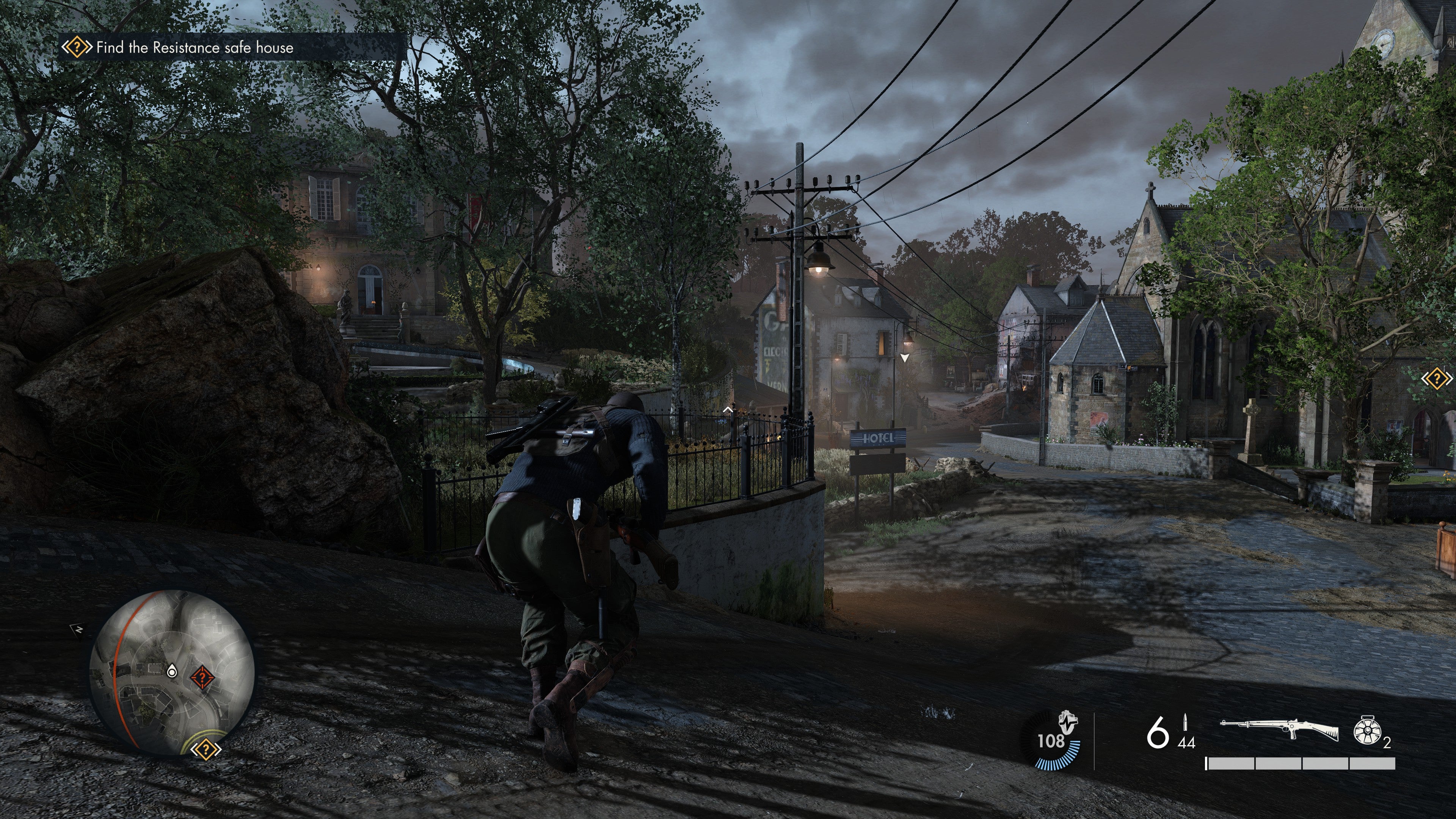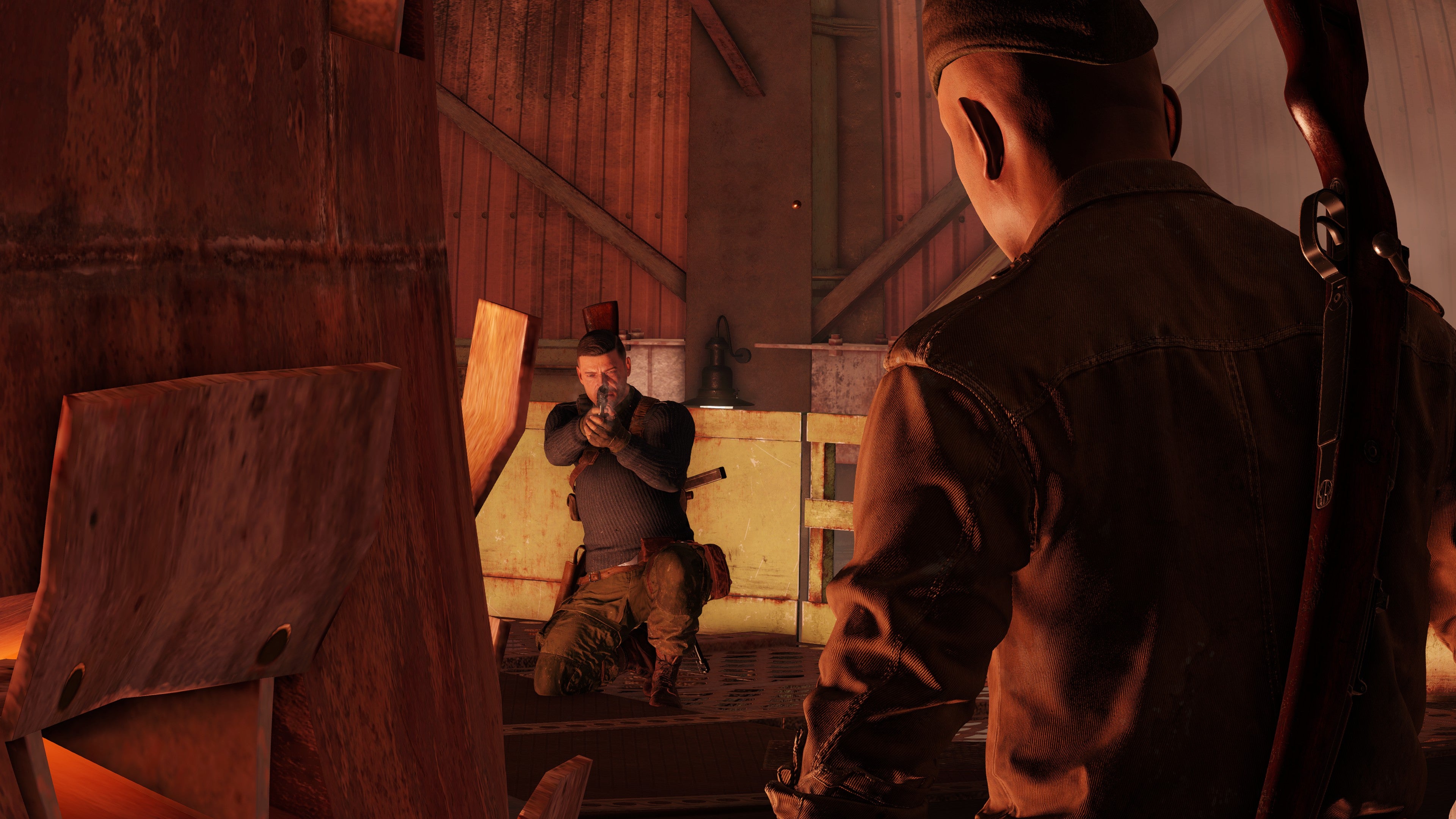With the benefit of hindsight, there were signs Sniper Elite might turn into something special. While known mainly for its ‘X-Ray’ system, which lets you watch your bullets pass through enemy bodies in grotesque anatomical detail, Sniper Elite has been slowly unveiling its potential since 2014’s tour of Africa in Sniper Elite 3. The maps have grown larger, more open and more ambitious while the once clunky movement and combat have become steadily more refined. Sniper Elite has been dependably entertaining for a while. It just needed a spark of inspiration to make it excellent. Sniper Elite 5 finds that spark in an unlikely place: the Allied invasion of France. Of all the second world war theatres, Operation Overlord is the most exhaustively explored by video games, replicated endlessly since 2002’s Medal of Honor: Allied Assault. I’m more familiar with the hedgerows of Normandy than I am with my own back garden, and find the idea of playing a game set there similarly unexciting. By all logic Sniper Elite 5 should feel more derivative than the previous games. Instead, the fallow fields of France force Rebellion to be more resourceful in their level design, and the studio reinvigorates the setting with inventive locations and an intricate eye for detail. Sniper Elite 5 kicks off before the events of D-Day, with veteran brain-popper Karl Fairburne slipping behind the Atlantic Wall to rendezvous with the French Resistance and lay the groundwork for the invasion. The opening mission sets the standard for all that follows, taking place in a sprawling chunk of the Normandy coastline that compiles all the greatest hits of the French liberation. There’s a giant radar dish to sabotage, a bunch of ’eighty-eight’ artillery guns to scupper, and a picturesque village where a Nazi general wanders around waiting to have his skull ventilated. Even at this stage, Sniper Elite 5 feels like a marked improvement over previous games. Not only do the maps flow more organically, but Fairburne is more elegant in his traversal of them, able to weave gracefully between Nazi patrols and dispatch enemies at close quarters with quick, brutal melee kills. It’s worth noting that Sniper Elite 5 is more unashamedly gruesome than ever before. Arterial spray hisses out of bodies like air from a tyre inflation hose, while the X-Ray system is extended to both melee and sidearm attacks. But it wasn’t until the third mission, Spy Academy, where I fully grasped what raises this above its predecessors. Sniper Elite 5’s signature level, Spy Academy opens with a glorious panoramic reveal of Beaumont Saint-Denis, a stunning fictional recreation of the tidal island of Mont Saint-Michel. From across the water, it seems like a sniper’s paradise. Wehrmacht soldiers patrol openly on the narrow stone bridge connecting the island to the mainland, while circling Luftwaffe planes provide reliable audio cover for your shots. As you infiltrate the island proper, however, it becomes clear that this is no simple shooting gallery. The narrow medieval streets, combined with the level’s continuously upward progression, make effective sniping opportunities rare. Instead, you must rely on Fairburne’s other skills and equipment, taking out enemies at close range with silenced pistols and melee kills, and carefully deploying teller mines to eliminate the patrolling German motorcycles. In this way, Sniper Elite 5 perfects the balance between sniping and more general stealth. No one tactic works universally. Sniper Elite 5 is more liberal with suppressed weapons, for example, letting you attach a suppressor to pretty much anything. But suppressed is not the same as silent, and you still need guards to be fairly isolated (or a low level of ambient noise) for suppressed shots to go unnoticed. Alternatively, you can also minimise your chances of detection by using ‘subsonic’ sniper rounds. These are quieter than standard ammunition, but are less powerful and less accurate. Completely silent kills can only be achieved up close, which has its own inherent drawbacks. On the flipside, no tactic feels redundant either. If there are no obvious opportunities to take out guards unnoticed, you have innumerable tools to create them, from objects in the environment that can be sabotaged to create ambient noise, to Fairburne’s own wide range of equipment designed for both distraction and elimination. One of my favourite gadgets is the “Schu” mine, a non-lethal explosive that can lure in troublesomely placed guard for quick, quiet knockouts. Indeed, Sniper Elite 5 has a suite of tools for playing non-lethally, including “wooden” bullets for all weapon classes. To me this seems like ordering a salad in a steakhouse – Sniper Elite is one of the few stealth games where a lethal approach feels entirely appropriate. But it’s good to have the option nonetheless. Spy Academy will likely be the level everyone remembers, but it’s just one of several tremendously realised locations – the best sandboxes this side of IO’s Hitman trilogy. The fourth level, War Factory, takes place in a sprawling industrial complex where Fairburne sabotages towering blast furnaces and sweltering steelworks. The sixth level, Libération, is like half a Call of Duty campaign crammed into one level, a rolling valley filled with French villages guarded by tanks, armoured cars, and counter-snipers. One of the most open-ended levels in the game, Libération provides ample opportunity for sniping, stealth, or blowing the scheiße out of everything with Panzerfausts and anti-tanks guns. None of which is to say that Sniper Elite 5 is perfect. While the majority of the levels are excellent, a couple of them are merely ‘good’. The weakest is probably Festung Guernsey, which feels too much like a rerun of the first level albeit with some pleasingly alien-looking German fortifications. The plot, meanwhile, is largely disposable, although it doesn’t pretend to be complicated, and the secret project Fairburne is tasked with unravelling – Operation Kraken – builds a vaguely interesting threat out of plausible components. The AI offers a decent challenge, especially on harder difficulties. But it’s still prone to the odd quirk, like getting caught in a cycle of passive and alert phases. If this was everything Sniper Elite 5 had to offer, alongside other extant features like multiplayer and cooperative campaign functionality, I’d simply recommend it and call that dinner time. But there’s one crucial ingredient I haven’t mentioned yet – invasions. Play Sniper Elite 5 online, and there’s a chance your game will be gatecrashed by a ‘Jager’ sniper, controlled by another player. At this point, Sniper Elite 5 switches gear from a methodical stealth sandbox into a thrilling fight for survival. Multiplayer invasions are far from a new idea, but Sniper Elite’s diverse maps and wide variety of equipment makes it the perfect stage for some wickedly tense cat and mouse action. With a Jager in play, rounding every corner could see you tread on a teller mine, or be gifted a brand new orifice from half a mile away. During one invasion, I spent 15 minutes circling my invader around a lavish château, before finally taking them down from the balcony of the building’s private concert hall. In another encounter, my invader and I mutually incapacitated each other, and the round turned into a frantic race to see who could patch themselves up the quickest. Invasions fit into Sniper Elite like ten grams of lead into an SS officer’s eye-socket. But Rebellion also makes some smart iterations on the formula. The game pings you the approximate location of your foe to minimise fruitless wandering, and will highlight your respective positions if you spend too long camping in one place. It also lets both sides request a rematch once the fight is over, letting you temporarily shelve your mission for a few rounds of ad-hoc deathmatch. When you’re finished, the game either continues on, or it pops you back to your most recent save. This makes it less neatly integrated than, say, Deathloop’s invasions, but it also makes it more flexible and less frustrating, leaving you more inclined to keep the system switched on. Through its invasion mechanic, Sniper Elite 5 achieves the ultimate goal of any sniping game, to capture the tension and drama of Jude Law and Ed Harris squaring off in Enemy at the Gates. If, like me, you watched that film when you were too young to do so, and thought “I wish there was a game that let me do that”, rather than the more balanced “wow, war is terrible,” then Sniper Elite 5 is that game, just without the Russian setting or Rachel Weisz. Couple that with eight superbly flexible sandboxes and the most imaginative interactive representation of the second world war in at least a decade, and you’ve got yourself one of the most entertaining games of the year.



